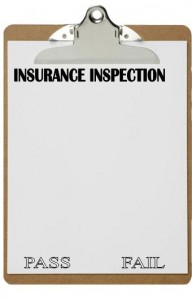What To Expect When Your Insurance Company Conducts An Inspection Of Your Home

Insurance Company Inspection:
When you switch insurance providers, or when you have been with the same provider for a number of years, you may receive a letter informing you that an inspector will be visiting your property to make sure it is an insurable risk and they will be completing an inspection. They will be looking at the following areas of your home:
Electrical:
Minimum service size of 100 amps; breaker panel (although a fuse panel is acceptable with some caveats) aluminum wiring; knob & tube wiring; obvious handyman additions and repairs; Electrical Safety Authority Certificates of Inspection for work done; ground fault protection in bathrooms; laundry rooms and outdoors.
Heating:
Age of furnaces; age of fuel supply tanks (oil or propane); WETT certification of any wood burning equipment; portable electric heaters used for permanent heating supply; condition of chimneys; condition of ductwork or boiler supply and return pipes and if they have asbestos insulation;.
Plumbing:
Copper or plastic (good) or lead or galvanized (bad) water supply pipes; copper or plastic (good) or galvanized or cast iron (bad) waste pipes; corrosion at pipe joints; rust on hot water tanks; age of sump pumps; back-up systems for sump pumps; age and documentation for septic systems; no-freeze outdoor hose bibs; swimming pool pumps and piping and hot tubs.
General:
Age of roof (less than 10 years good); cedar shakes (bad), shingles (good), aluminum or steel (really good); junk laying around (tripping hazards) walks not shovelled (fall hazards) railings on decks; railings on indoor/outdoor stairs; fences around pools; outstanding municipal work orders; storage of fuel, oil or grease containers and unlicensed vehicles in the yard.
After the inspection, your home will be given a clean bill of health, or you will receive a list of deficiencies that require re-mediation and a a time limit to address those deficiencies. If you have a licensed contractor make the repairs, he should provide you with a letter for your insurance company that the defined work has been completed or you may choose a re-inspection by the insurance company.



